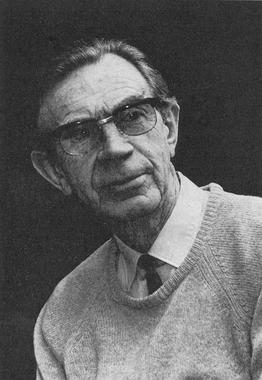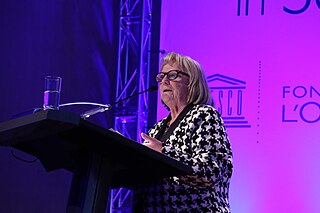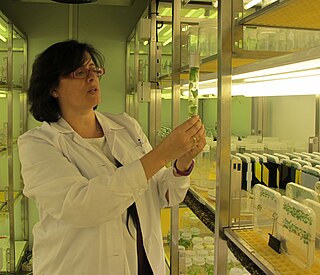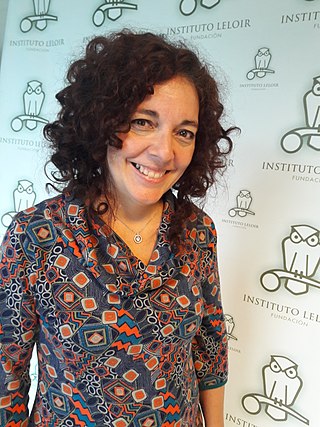
In physical geography, tundra is a type of biome where tree growth is hindered by frigid temperatures and short growing seasons. The term tundra comes through Russian тундра from the Kildin Sámi word тӯндар meaning "uplands", "treeless mountain tract". There are three regions and associated types of tundra: Arctic tundra, alpine tundra, and Antarctic tundra.

Bonnie Lynn Bassler is an American molecular biologist; the Squibb Professor in Molecular Biology and chair of the Department of Molecular Biology at Princeton University; and a Howard Hughes Medical Institute Investigator. She has researched cell-to-cell chemical communication in bacteria and discovered key insights into the mechanism by which bacteria communicate, known as quorum sensing. She has contributed to the idea that disruption of chemical signaling can be used as an antimicrobial therapy.

The L'Oréal-UNESCO For Women in Science Awards, created in 1998, aim to improve the position of women in science by recognizing outstanding women researchers who have contributed to scientific progress. The awards are a result of a partnership between the French cosmetics company L'Oréal and the United Nations Educational, Scientific and Cultural Organization (UNESCO) and carry a grant of $100,000 USD for each laureate. This award is also known as the L'Oréal-Helena Rubinstein Women in Science Awards.

Elaine V. Fuchs is an American cell biologist famous for her work on the biology and molecular mechanisms of mammalian skin and skin diseases, who helped lead the modernization of dermatology. Fuchs pioneered reverse genetics approaches, which assess protein function first and then assess its role in development and disease. In particular, Fuchs researches skin stem cells and their production of hair and skin. She is an investigator at the Howard Hughes Medical Institute and the Rebecca C. Lancefield Professor of Mammalian Cell Biology and Development at The Rockefeller University.

Vestereng is a nature site in the environs of northern Aarhus and the suburb of Skejby. The name literally translates as 'westward meadow'. The Municipality of Aarhus took ownership in 1939.

Thorvald (Thorwald) Julius Sørensen was a Danish botanist and evolutionary biologist.

Janet Rossant, is a developmental biologist well known for her contributions to the understanding of the role of genes in embryo development. She is a world renowned leader in developmental biology. Her current research interests focus on stem cells, molecular genetics, and developmental biology. Specifically, she uses cellular and genetic manipulation techniques to study how genes control both normal and abnormal development of early mouse embryos. Rossant has discovered information on embryo development, how multiple types of stem cells are established, and the mechanisms by which genes control development. In 1998, her work helped lead to the discovery of the trophoblast stem cell, which has assisted in showing how congenital anomalies in the heart, blood vessels, and placenta can occur.

Cecilia Bouzat is an Argentine biochemist, who studies neurological disorders. In 2014 she was honored as the Latin American Laureate by the L'Oréal-UNESCO Award for Women in Science. In 2015, she was listed as one of BBC's 100 Women.
Kathrin Barboza Márquez is a Bolivian biologist who is an expert in bat research. In 2006, she and a research partner discovered a species thought to be extinct and in 2010, she was awarded the National Geographic's "Young Explorer Grant". She became the first Bolivian scientist to win a L'Oréal-UNESCO Fellowship for Women in Science in 2012 and in 2013 was named by the BBC as one of the top ten Latin American women of science.
Diana Marcela Bolaños Rodríguez is a Colombian marine biologist who has studied and classified various types of platyhelminths. She was a recipient of the L'Oréal-UNESCO Fellowship for Women in Science in 2010, was selected as Colombian biologist of the year in 2012, and in 2013 was named by the BBC as one of the top ten women in science in Latin America.

Gloria del Carmen Montenegro Rizzardini is a botanist, biologist, academic and scientist. She is Professor of Botany at the Pontificia Universidad Católica de Chile. She won the L'Oréal-UNESCO Awards for Women in Science in 1998. She has undertaken pioneering work in botany and conservation of native flora, using scientific approaches to protect plant ecosystems.
Lúcia Mendonça Previato is a Brazilian biologist. She was awarded the L'Oréal-UNESCO Awards for Women in Science in 2004 for her research into preventing Chagas disease.

Elena Ramírez Parra is a Spanish botanist and researcher who studies the negative effects of environmental stress on plant growth. Applications of her research include improving harvest yield. In 2010, Ramírez won a L'Oréal-UNESCO Award for Women in Science.
Lubna Hamid Tawfiq Tahtamouni is a Jordanian biologist known for her work in developmental biology and cancer research. She is the head of the Department of Biology and Biotechnology at Hashemite University in Zarqa, Jordan. She has won multiple awards for her work on breast cancer, and is known as an advocate for allowing young women in the Arab world to choose a career in science. In 2016, she was named one of BBC's 100 Women.
Mariana Meerhoff is a Uruguayan researcher and Full Professor at the University Center of the Eastern Region of the University of the Republic (UdelaR). She is also honorary associate researcher at Aarhus University and a member of the Advisory Board of the South American Institute for Research and Education in the Sustainability and Resilience Sciences (SARAS). Likewise, she works as a Level 5 Full Professor of the Basic Sciences Development Program (PEDECIBA), and is a Level 3 Researcher of the Sistema Nacional de Investigadores of the National Research and Innovation Agency of Uruguay. She currently has more than 90 publications of scientific articles in peer-reviewed journals. In 2011 she was recognized with the L'Oréal-UNESCO Award for Women in Science for the project "Ecosystem functioning in water bodies: effects of the degree of impact and the opening of the ecosystem". In 2015 she received the International Recognition of Professional Excellence in Limnology (IRPE) and the national Roberto Caldeyro Barcia-PEDECIBA Award.
Else Marie Friis is a Danish botanist and paleontologist. She is Professor Emerita in the Department of Geoscience at Aarhus University. Her work has been fundamental in the phylogenetic analysis of angiosperms, with widespread application to reproductive biology.
Katharine Arwen Michie is an Australian structural biologist, biochemist and physicist. In 2005 she was named a Fellow of the L'Oréal-UNESCO Awards for Women in Science and was also awarded a Marie Curie International Research Fellowship in January, 2006. Michie is currently in charge of the Structural Biology X-ray Facility, a part of the Mark Wainwright Analytical Centre, at the University of New South Wales, Sydney.

Vanesa Gottifredi is an Argentine chemist and biologist. She works as a researcher in the Principal Investigator category of the Scientific and Technological Researcher Program (CICT) of the National Scientific and Technical Research Council (CONICET). She is also head of the Leloir Institute's Cell Cycle and Genomic Stability Laboratory. She specializes in the mechanisms of tumor cell response to chemotherapy, work for which she was awarded by the Alexander von Humboldt Foundation and L'Oreal-UNESCO.
Jacqueline Chaparro Olaya is a Colombian biologist and parasitologist, recipient of the L’Oréal-UNESCO for Women in Science grant in 2001 for her research on the application of molecular techniques in the field of infectious diseases.
Andia Chaves Fonnegra is a Colombian marine biologist known for her research on the marine sponge Cliona delitrix.










